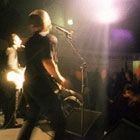Review
Wire
Triptych Festival, Lemon Tree, Aberdeen, UK (April 29, 2004)
The last big showcase gigs in Aberdeen were back in the 1970s when star-studded line-ups from Stiff Records and Two-Tone appeared in the city. Tonight it's the turn of Mute Records, which sprang to prominence during the 1980s with hits from The Normal and Depeche Mode. Now in its 25th year, Daniel Miller's label maintains an uncomfortable presence at the far edge of popular music with signings like Pansonic and Wire.
Formed in 1976, Wire made their mark with two tracks on the Live at The Roxy LP—Lowdown, a brooding monster of a song, and 12XU, pure punkarama with an edge of darkness. You could—and we did—argue all night whether Wire were punk or not but the band themselves didn't give a toss, carving out their own sonic landscape regardless.
Their exalted reputation rests largely on a trilogy of albums released 1977-79: Pink Flag, Chairs Missing and 154. While Pink Flag was quirky punk-pop brimming with short, sharp shocks and buzzsaw guitars, Chairs Missing elevated the band to even greater heights of musical schizophrenia, and lush melodies, which were often ripped apart by vicious pop hooks. 154 continued onwards and upwards, painting irresistible new vistas where psychedelic charm collided with Wire's trademark guitar attack to stunning effect, the three albums as fresh today as when first released.
With live appearances few and far between, this is Wire's first visit to the city and the crowd stands hushed until a hypnotic bassline cuts through the darkness. A sea of synths washes over us, one tiny, blinking light revealing the slight figure of Colin Newman centre-stage. His urgent vocal counterpoints the flickering, hand-held spotlight wielded by bassist Graham Lewis, who's appeared like some gigantic form ripped from an early Communist propaganda poster. Already, the show has taken on a strange life of its own.
Our expectations are shredded and fed back to us in a complex mesh of sound, reminding us that one of Wire's great strengths is a willingness to explore the outer reaches unfettered by tradition. Great slabs of electronic sound are cut and pasted into an aural blitzkrieg that's joyous yet disturbing at the same time.
Bruce Gilbert foregoes the histrionics of less-talented musicians and stands unmoving, his casual appearance defied by the wicked riffs ripping from his guitar. Lewis is a study in glistening concentration, barking lyrical contributions over thundering bass lines and bringing home to us there was never any great dichotomy between punk and art where these guys are concerned.
Without ever opening his eyes, Robert Gotobed underpins the whole, mighty edifice with his relentless drumming. This leaves Newman as the band's natural focal point. But even with Wire producing enough energy to light a small city, the visual dramatics are kept to a minimum, and rightly so—the audience has quite enough to cope with as it is, thank you very much.
Wherever Wire may be they are far from in decline. This was never going to be a traditional concert of tried and tested favourites but we are presented, instead, with a fiery mix of more recent compositions, each delivered with a power and conviction that leaves so-called contemporary guitar bands like The Thrills or Libertines gasping in the slipstream of authentic rock and roll. Mute? I was lost for words.
Peter Thomson
